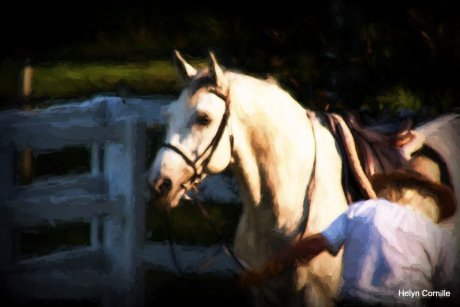The Walking
The Walking
Jean Luc Cornille
Equine Ergonomics

The problem with political jokes is that quite often they get elected. They do the talking and, since we have to do the walking, why not ride our horse and move faster away from their nuisance and closer to nature.
Walking with the horse re-tunes us with reality, honesty, ethic, decency, the reason why we are born. We have a brain capable of knowledge and above all, capable to apply new knowledge. We have a brain capable to understand differences and instead of judging differences, we have a brain capable to benefit from differences. As we walk with the horse small events remind us that our nature has not evolved as the horse's nature did. Paraphrasing Plato, we have, as humans, devised ways to measure the physical world. Our perception of reality is a construction of our human mind and not a faithful replica of reality. A sound does not occur unless it is in a frequency range that can be heard. The horse stops, lifts the head alerted, his heart is pounding, looking in a given direction. We look in the same direction as our sight is our main perception, we see nothing, and we judge the horse from our umwelt. "There is nothing, you should not stop, you should listen." Listening might very well be what the horse just did. The horse's area of high-frequency hearing cans goes up to 33.000 Hz., or cycles per second, while humans are limited to 20.000Hz. The sound was out of our range. It did not exist in our world but was real in the horse's world.
The term "Umwelt" characterizes the peculiar perceptual world of a species. Each species evolves the Umwelt which allows it to extract from the external world the information its ancestors needed for survival. We might be annoyed because walking along the way, the horse wants to investigate a pile of manure. Maybe the horse recognizes a friend and wonder how long ago the friend went by. Our ego interprets the horse curiosity as disobedience. Our olfactory system is vestigial and we cannot understand the information that the horse perceived from this manure pile. Maybe we should realize that we might soon benefit from the horse's very practical sense of olfaction. Day light is darkening and it is likely the horse's nose that will bring us back home.
We might arrive at the barn in our new breeches, tan gloves, new helmet, dressed to affirm our leadership. The horse already knows about our fear. Angry, frustrated, and emotionally upset humans release products in their sweat. The horse does have a vomeronasal structure allowing him to scent non-volatile molecules such as found in body secretion. Why don't we drop our pretentions and act with the horse as a friend? He knows all about us and, if we are honest with him, still like us. Why don't we drop all these political fake in the swamp of the political jokes, fake love, fake results like the scores in the show ring, fake soundness depending on injection, fake training making a talents horse executing movement with a dysfunctional physique. What is the point of living a fraud when we can learn true life?
It does not take more time to teach a horse how to coordinate his physique for the athletic demand of the performance, we don't get a better score in the show ring because judges are not educated to distinguish a horse athletically coordinated for the effort from a skilled horse performing with a dysfunctional physique, but we don't have to inject every joints before the next show. We can love the horse, with our heart, not with our ego, because his education is not about submission to the "correct aids," but about teaching his brain to process efficient and complex coordination of his physique. We can look at the ones who make it simple for who they are, charlatans, and realize that complexity is the core of every art, and a pleasure that we have the intelligence to master. "What makes it art, is that the person who made it overcame the resistance, ignored the voice of doubt and made something worth making. Something risky. Something human." (Seth Godin)
We can make the horse benefit from new scientific knowledge. Instead of sclerosing our talent within the doctrines taught by the group that we have elected to follow, we can explore greater understanding of equine nature allowing the horse to further explore and express his talent. This is a fantasy if we try to make it happen within the limits of ancestral theories. This is reality, and a delightful one, if we are critical enough to upgrade the wisdom of centuries to actual knowledge.
This is the teaching of the science of motion, which is entering the new year and new decade with a new education approach.
Chazot, Charpege, Helyn and Jean Luc


